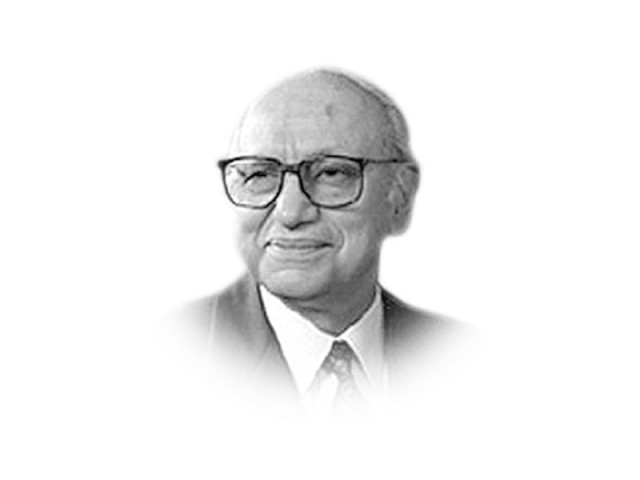A noble lie
It is more important to capture the principle of the issue and the foundation of the theory of judicial recusal

The writer is a noted lawyer, human-rights activist and a former law minister of Pakistan
Referring again to the statement of the learned judge, he went on to add: “To resign only takes five minutes, after that I will go straight away to home, I might not even go to my chamber.”
Is recusal by a judge such a sin or a taboo that the thought of it forces the judge to leave office “and not go even to his chamber”? How does 1973 Constitution treat judicial recusal? The highest body to determine the conduct of a judge of Supreme Court consists of inter alia three senior most judges of the Supreme Court and “if any judge (member of SJC) has to face the charge of conduct, the judge of Supreme Court next in seniority shall act in his place”. It leaves no discretion with a judge to decide whether he recuses himself or not. (Article 209(3))
The code of conduct for the judges of the Supreme Court inter alia provides that “a judge should decline resolutely to act in a case involving his own interest” and that “justice should not only be done but is also seen to be done”. (Article IV)
The law of contempt of court enunciates that a judge, who takes notice of contempt or with regard to whom judicial contempt is alleged to have been committed, shall not try the case (Section 11). Even corporate law substantively provides for a similar requirement. In such a situation, a number of judges and directors have recused themselves.
The rationale for refusing to recuse is that even when bias is alleged against the judge, it will not influence him or “I have confidence in myself that I can do justice irrespective of the bias.” (Some Urdu papers have quoted the judge making a similar statement that “I have full confidence in myself”).
Let us see what Justice Frank had said on such confidence in a famous case:
“Much harm is done by the myth that merely by putting on a black robe and taking the oath of office as a judge, a man ceases to be a human being and strips himself of all predilections and becomes a passionless thinking machine. The concealment of the human element in the judicial process operates in an exaggerated manner.”
The aforesaid myth has been termed a ‘noble lie’. Judge Frank, therefore, recommends that judges should “avow that they are human” and “human element allows bias to creep in”. In the words of Professor Harry Abraham, “when any doubt, do not sit”. But no one recommend resignation.
Judicial recusal is now favourably recommended in most democratic countries, its foundation being three laudable principles, which are accepted as legal maxims: 1) no one can be a judge in his own cause; 2) justice should not only be done but shall manifestly and undoubtedly seen to be done; and 3) bias vitiates the proceedings including the conclusion.
It is believed that these maxims ensure a fair trial. The concept of fair trial is included as a fundamental right (Article 10-A of the Constitution). It may be appropriate to have a brief survey of the jurisprudence of some of the other countries regarding judicial recusal.
In the US, the general principle is, “the judge is expected, after hearing the reasons for bias, to recuse himself if reasonable apprehension of bias is shown not as the relevant judge perceives it but how a reasonable litigant apprehends”.
The US, in 1974, passed the law 28 USCA Section 455, which states: “Justice/judge of the US shall disqualify himself in any proceeding in which his impartiality might reasonably be questioned.” The touchstone for recusal or otherwise is not the “confidence of the judge in himself”. The oft-quoted case is of Justice Scalia, who recused himself from a case where bias was alleged against him without entering into the discussion on alleged bias. It was observed in another famous case that “under our precedence, there are objective standards that require recusal when the probability of actual bias is there. Hence in all the circumstances of the case, due process mandates recusal.”
Coming to the UK, the House of Lords in a well-known Pinochet case set aside its own previous judgment as one of the judges, Lord Hoffmann, was shown to have a remote bias. Lord Hoffmann was praised in this very judgment to be an upright man and honest judge to a limit, yet a reasonable bias did appear and the whole judgment was held to be null and void. According to Lord Brawn Wilkinson, the author of the judgment, “The fundamental principle is that a man may not be judge in his own cause” and that “by some way the judge’s conduct or behaviour apprehends a suspicion that the judge is not impartial, the judge must recuse himself”. This principle is generally adhered to in other democratic countries.
The famous lawyer and scholar, AG Noorani contributed an article in Dawn, where he has referred to a definitive work by Grant Hammoud who gave a terse advise to judges: “Prudence naturally leans on the side of being safe rather than being sorry.”
It is the litigant who brings his case to get justice and if he suspects that a judge may not hear his case fairly because he has a ground for bias, then the act of recusing by a judge does not in any way harm the independence of the judiciary or hurt the integrity of a judge. As a matter of fact, judges who recuse themselves are duly respected and are considered to be independent and interested in justice and not the case. I have come across a number of cases during my practice where judges have recused themselves when some reasonable bias had been shown. In a case, Justice Nasirul Mulk, when issue of bias was raised before him, stated in Court that although the biases are remote, yet I recuse myself. He was respected not only in the eyes of the public but also amongst lawyers. After recusal he did not retire nor did he go home; instead he rose to become the chief justice of the Supreme Court, earning respect from the bar and public. A recent example is that of former chief justice Iftikhar Muhammad Chaudhry, who recused himself in the case of Dr Arslan Iftikhar (PLD 2012 SC 664) and Justice Jawwad S Khawaja contributed his opinion by penning down that “indeed, it is the cornerstone of the administration of justice in this country that all people, whether they appear to us innocent or guilty, are entitled to the due process”. (Justice Ajmal Mian is yet another glorious example.)
Published in The Express Tribune, August 8th, 2015.
Like Opinion & Editorial on Facebook, follow @ETOpEd on Twitter to receive all updates on all our daily pieces.














COMMENTS
Comments are moderated and generally will be posted if they are on-topic and not abusive.
For more information, please see our Comments FAQ